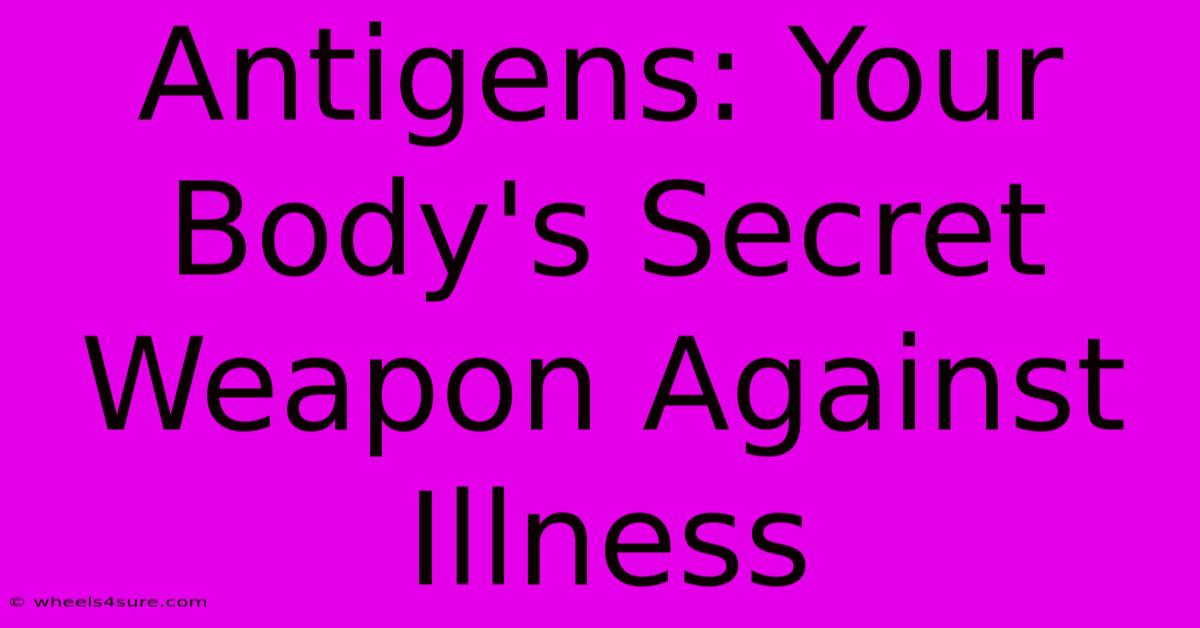Antigens: Your Body's Secret Weapon Against Illness

Table of Contents
Antigens: Your Body's Secret Weapon Against Illness
Our bodies are in a constant battle against invading pathogens – bacteria, viruses, fungi, and parasites. But how does our immune system know what to attack? The answer lies in antigens. These tiny molecular flags are the body's way of identifying friend from foe, triggering a powerful defense mechanism to protect us from illness. Understanding antigens is key to understanding how our immune system works and how vaccines protect us.
What are Antigens?
Simply put, an antigen is any substance that can trigger an immune response. These substances are often found on the surface of pathogens, acting like unique identification tags. They can be proteins, polysaccharides, lipids, or even nucleic acids. Think of them as the "wanted posters" of the immune system. When an antigen is detected, it alerts the body to the presence of a foreign invader.
Types of Antigens:
Antigens aren't all created equal. They can be categorized in several ways:
- Exogenous antigens: These originate outside the body and enter through various routes like inhalation, ingestion, or injection. Examples include pollen, bacteria, and viruses.
- Endogenous antigens: These are produced within the body's cells, often as a result of viral or intracellular bacterial infections. The immune system recognizes these as "self" cells that have been compromised.
- Autoantigens: These are normally harmless molecules found within the body, but the immune system mistakenly identifies them as threats. This misidentification is at the root of autoimmune diseases like rheumatoid arthritis and lupus.
How Antigens Trigger the Immune Response
The immune system's response to an antigen is complex and multifaceted. Here's a simplified overview:
-
Antigen Recognition: Specialized cells, like macrophages and dendritic cells, engulf and process antigens. They then present fragments of the antigen on their surface, displaying them to other immune cells.
-
T-cell Activation: Helper T-cells recognize the presented antigen and become activated. These cells orchestrate the immune response, coordinating the actions of other immune cells.
-
B-cell Activation: B-cells, another type of immune cell, also recognize the antigen. Activated B-cells differentiate into plasma cells, which produce antibodies.
-
Antibody Production: Antibodies, also known as immunoglobulins, are Y-shaped proteins that specifically bind to the antigen. This binding neutralizes the pathogen, marking it for destruction by other immune cells.
The Role of Antigens in Vaccines
Vaccines are a powerful tool in preventing infectious diseases. They work by introducing weakened or inactive forms of antigens from a particular pathogen into the body. This exposure stimulates an immune response without causing the actual disease. The body produces antibodies and memory cells, providing long-lasting immunity against future encounters with the actual pathogen. This is why vaccination is so effective in protecting populations against diseases like measles, mumps, rubella, and influenza.
Antigens and Allergies
While antigens usually protect us, sometimes they can trigger unwanted reactions. Allergies occur when the immune system overreacts to a harmless antigen, such as pollen or pet dander. This overreaction leads to the release of histamine and other inflammatory chemicals, causing symptoms like sneezing, itching, and rash.
Understanding Antigens: A Key to Better Health
Understanding antigens is crucial for comprehending how our immune system functions and how we can protect ourselves from infectious diseases. This knowledge underscores the importance of vaccination and highlights the complex mechanisms that keep us healthy. Further research into antigens continues to pave the way for new treatments and advancements in immunology and medicine. By understanding these tiny molecular flags, we can better appreciate the incredible power and complexity of the human immune system.

Thank you for visiting our website wich cover about Antigens: Your Body's Secret Weapon Against Illness. We hope the information provided has been useful to you. Feel free to contact us if you have any questions or need further assistance. See you next time and dont miss to bookmark.
Featured Posts
-
How Did Woody Allens Marriage Impact His Public Image
Apr 04, 2025
-
Elizabeth Hurley And Son A Journey Through Time
Apr 04, 2025
-
Best Dad Jokes 2024 The Perfect Gift For Any Dad
Apr 04, 2025
-
Ivan Lendl Net Worth And Philanthropic Efforts
Apr 04, 2025
-
The Silent Children Of Ruth Ellis Their Untold Stories
Apr 04, 2025
